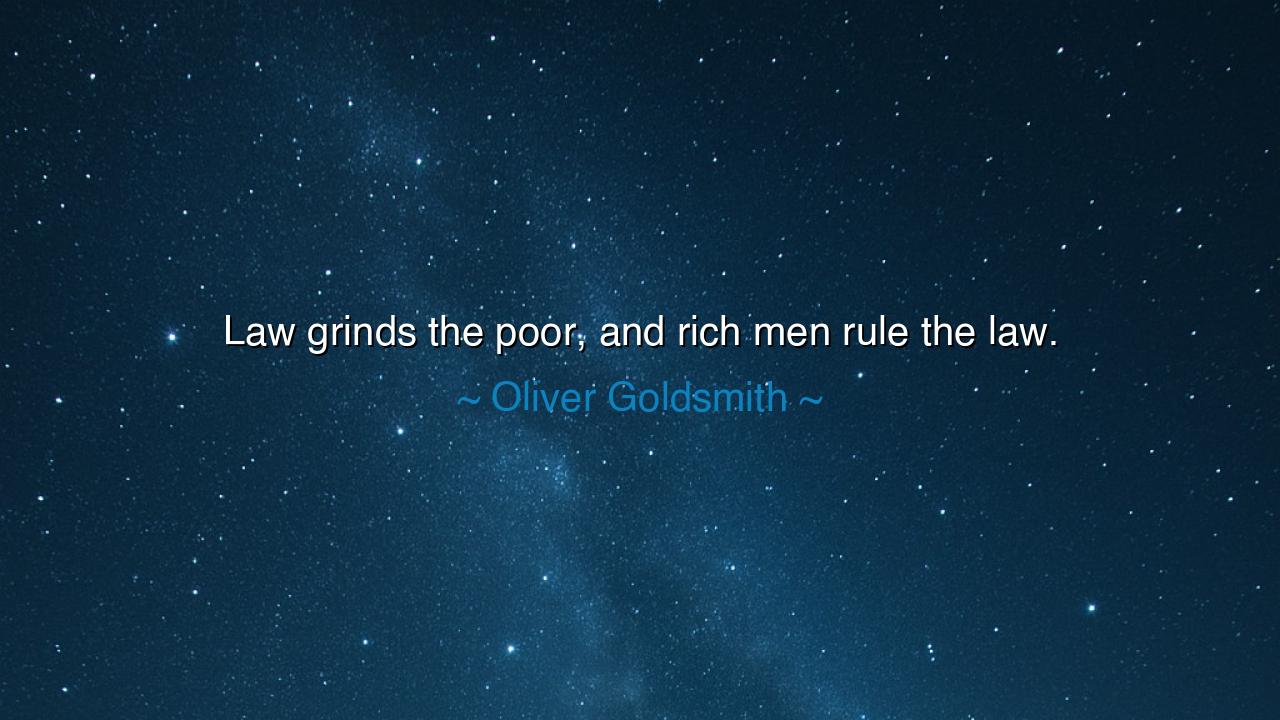
Law grinds the poor, and rich men rule the law.






Hear the words of Oliver Goldsmith, poet and moralist of the eighteenth century, who unveiled with sorrow and fire the corruption of human justice: “Law grinds the poor, and rich men rule the law.” In these words lies no gentle wisdom, but a sharp cry against the inequities of the world. For the law, which ought to be a shield for the weak, too often becomes the millstone that crushes them. And those who should be bound by it, the rich men, too often twist and command it to their own desires. Goldsmith speaks as one who gazed upon the courts of men and saw not balance, but imbalance; not justice, but injustice.
The origin of this saying lies in the deep currents of Goldsmith’s time. He lived in an England where the gulf between the wealthy and the poor was vast, where debtors were cast into prison, where the peasantry starved while aristocrats feasted. The law, written and upheld by those of privilege, claimed to be impartial, but in truth it bent toward the interests of the powerful. Goldsmith, with his pen, sought to reveal this hypocrisy: that what was exalted as “justice” often became the weapon of the mighty against the lowly.
This lament is not bound to his century alone. Consider the story of the French Revolution. For centuries, the common people of France bore the crushing weight of taxation, while the nobility and clergy were shielded by privilege. The law ground the poor, binding them to toil and hunger, while the rich ruled the law, shaping decrees to protect their wealth. At last, the imbalance grew unbearable, and the people rose with fury, overturning throne and altar alike. Here we see Goldsmith’s words written in fire and blood: when law is not justice, rebellion becomes the last recourse.
The same truth echoes in modern times. Across nations, the poor find themselves entangled in fines, debts, and punishments for small offenses, while the powerful escape accountability through wealth, influence, or connections. Corporations with riches can bend regulations, hire armies of lawyers, and reshape laws themselves, while ordinary citizens are crushed beneath the very systems meant to protect them. Goldsmith’s cry is still the cry of the oppressed: law, in the hands of the powerful, ceases to be justice and becomes tyranny.
Yet within this lament there is also a call. If law grinds the poor, then the task of the righteous is to labor for laws that uplift, not destroy. If rich men rule the law, then the people must strive for systems where power is accountable, where justice is not bought but shared. Goldsmith’s words are not only an accusation—they are a warning that a society built on such imbalance cannot endure. For when the millstone grinds too hard, it breaks.
The emotional force of this truth is heavy, but it can inspire courage. It tells us that vigilance is required, that justice is not a thing given once for all, but a flame that must be tended. History shows us again and again that when law serves only the powerful, it collapses into chaos; but when it is reformed to reflect fairness, it becomes the foundation of peace. Thus, Goldsmith’s words can stir us not to despair, but to action.
The lesson for us is clear: do not be passive before injustice. Speak, write, organize, and act so that law may be bent toward righteousness, not privilege. In your own life, defend those who have no defense, raise your voice when the voiceless are silenced, and hold accountable those who would twist justice for gain. For though Goldsmith showed us the corruption of law, he also handed us the truth that such corruption is not fate—it is a choice of men. And if men choose rightly, then law can be restored, no longer grinding the poor, no longer ruled by the rich, but standing as it was always meant to stand: the guardian of all.






AAdministratorAdministrator
Welcome, honored guests. Please leave a comment, we will respond soon